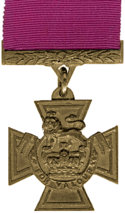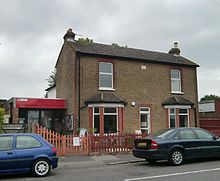- Norman Cyril Jackson
-
Norman Cyril Jackson 
Born 8 April 1919
Ealing, LondonDied 26 March 1994 (aged 74)
Hampton Hill, LondonBuried at Twickenham Cemetery Allegiance  United Kingdom
United KingdomService/branch  Royal Air Force
Royal Air ForceRank Warrant Officer Unit No. 106 Squadron RAF Battles/wars World War II Awards Victoria Cross Norman Cyril Jackson VC (8 April 1919 – 26 March 1994) was a sergeant in the Royal Air Force who earned the Victoria Cross during a bombing raid on Schweinfurt, Germany in April 1944. Born in Ealing, Middlesex, Jackson joined the RAF Volunteer Reserve in 1939 and originally served as an engine fitter. He retrained as a flight engineer and on 28 July 1943 he joined No. 106 Squadron which operated Avro Lancaster bombers.
Contents
Military career
Jackson completed his tour of 30 missions on 24 April 1944 but, as he had flown one sortie with a different crew, he chose to fly once more so that his original aircrew finished their tour together. Jackson's 31st mission took place on the night of 26–27 April 1944, when his crew flew in a raid on the German ball bearing factories at Schweinfurt.
Having bombed the target, Jackson's Lancaster (serial ME669) was attacked by a German night fighter and a fuel tank in the starboard wing caught fire. Jackson, already wounded from shell splinters, strapped on a parachute and equipped himself with a fire extinguisher before climbing out of the aircraft and onto the wing, whilst the aeroplane was flying at 200 mph, in order to put out the fire. He gripped the air intake on the leading edge of the wing with one hand, and fought the fire with the other. The flames seared his hands, face, and clothes. The fighter returned, and hit the bomber with a burst of gunfire that left two bullets in his legs. The burst also swept him off the wing, leaving him to fall 20,000 ft with a smouldering and holed parachute.
He suffered further injuries upon landing, including a broken ankle, but managed to crawl to a nearby German village where he was paraded through the street. He spent 10 months recovering in hospital before being transferred to the Stalag Kc prisoner of war camp. He made two escape attempts, the second of which was successful as he made contact with a unit of the US Third Army.
Jackson was promoted to Warrant Officer and his Victoria Cross award was gazetted on 26 October 1945.
Victoria Cross citation
Extract from Fourth Supplement, The London Gazette No 37324 of Friday 26 October 1945
The KING has been graciously pleased to confer the VICTORIA CROSS on the undermentioned officer in recognition of most conspicuous bravery :-
905192 Sergeant (Now Warrant Officer) Norman Cyril Jackson R.A.F.V.R., 106 Squadron.
This airman was the flight engineer in a Lancaster detailed to attack Schweinfurt on the night of 26th April, 1944. Bombs were dropped successfully and the aircraft was climbing out of the target area. Suddenly it was attacked by a fighter at about 20,000 feet. The captain took evading action at once, but the enemy secured many hits. A fire started near a petrol tank on the upper surface of the starboard wing, between the fuselage and the inner engine.
Sergeant Jackson was thrown to the floor during the engagement. Wounds which he received from shell splinters in the right leg and shoulder were probably sustained at that time. Recovering himself, he remarked that he could deal with the fire on the wing and obtained his captain's permission to try to put out the flames.
Pushing a hand fire-extinguisher into the top of his life-saving jacket and clipping on his parachute pack, Sergeant Jackson jettisoned the escape hatch above the pilot's head. He then started to climb out of the cockpit and back along the top of the fuselage to the starboard wing. Before he could leave the fuselage his parachute pack opened and the whole canopy and rigging lines spilled into the cockpit.
Undeterred, Sergeant Jackson continued. The pilot (Tony Mifflin), bomb aimer (Maurice Toft) and navigator (Frank Higgins) gathered the parachute together and held on to the rigging lines, paying them out as the airman crawled aft. Eventually he slipped and, falling from the fuselage to the starboard wing, grasped an air intake on the leading edge of the wing. He succeeded in clinging on but lost the extinguisher, which was blown away.
By this time, the fire had spread rapidly and Sergeant Jackson was involved. His face, hands and clothing were severely burnt. Unable to retain his hold he was swept through the flames and over the trailing edge of the wing, dragging his parachute behind. When last seen it was only partly inflated and was burning in a number of places.
Realising that the fire could not be controlled, the captain gave the order to abandon aircraft. Four of the remaining members of the crew landed safely. The captain and rear gunner have not been accounted for.
Sergeant Jackson was unable to control his descent and landed heavily. He sustained a broken ankle, his right eye was closed through burns and his hands were useless. These injuries, together with the wounds received earlier, reduced him to a pitiable state. At daybreak he crawled to the nearest village, where he was taken prisoner. He bore the intense pain and discomfort of the journey to Dulag Luft with magnificent fortitude. After ten months in hospital he made a good recovery, though his hands require further treatment and are only of limited use.
This airman's attempt to extinguish the fire and save the aircraft and crew from falling into enemy hands was an act of outstanding gallantry. To venture outside, when travelling at 200 miles an hour, at a great height and in intense cold, was an almost incredible feat. Had he succeeded in subduing the flames, there was little or no prospect of his regaining the cockpit. The spilling of his parachute and the risk of grave damage to its canopy reduced his chances of survival to a minimum. By his ready willingness to face these dangers he set an example of self-sacrifice which will ever be remembered.Legacy
In April 2004 Jackson's VC medal was sold at auction for £235,250 (GBP) against a pre-auction estimate of £130,000.[1] His VC is now on display in the Lord Ashcroft Gallery at the Imperial War Museum, London.[2]
References
- British VCs of World War 2 (John Laffin, 1997)
- Monuments To Courage (David Harvey, 1999)
- The Register of the Victoria Cross (This England, 1997)
- Bravest of the Brave (John Glanfield, 2005)
External links
- Burial location of Norman Jackson "Middlesex"
- News item "Norman Jackson's Victoria Cross sold at auction"
- Norman Jackson
- Norman Jackson on Find-A-Grave
Categories:- British World War II recipients of the Victoria Cross
- Royal Air Force recipients of the Victoria Cross
- Royal Air Force airmen
- People from Ealing
- Royal Air Force Volunteer Reserve personnel of World War II
- 1919 births
- 1994 deaths
- British prisoners of war
- World War II prisoners of war held by Germany
- Escapees from German detention
Wikimedia Foundation. 2010.

